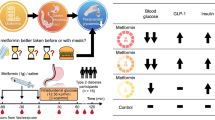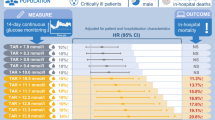ABSTRACT
BACKGROUND
The value of self-monitoring blood glucose (SMBG) in type 2 diabetes is controversial.
OBJECTIVE
To determine SMBG testing rates are positively associated with glycemic control in veterans on oral hypoglycemic agents (OHA).
DESIGN
Observational database study.
SUBJECTS
Southwestern Healthcare Network veterans taking OHA in 2002 and followed through the end of 2004.
MEASUREMENTS
OHA and glucose test strip (GTS) prescriptions were derived from pharmacy files. Subjects were categorized into five groups according to their end-of-study treatment status: group 1 (no medication changes), group 2 (increased doses of initial OHA), group 3 (started new OHA), group 4 (both OHA interventions), and group 5 (initiated insulin). We then used multiple linear regression analyses to examine the relationship between the SMBG testing rate and hemoglobin A1c (HbA1c) within each group.
RESULTS
We evaluated 5,862 patients with a mean follow-up duration of 798 ± 94 days. Overall, 44.2% received GTS. Ultimately, 47% of subjects ended up in group 1, 21% in group 2, 9% in group 3, 8% in group 4, and 16% in group 5. A univariate analysis showed no association between the SMBG testing rate and HbA1c. However, after stratifying by group and adjusting for initial OHA dose, we found that more frequent testing was associated with a significantly lower HbA1c in groups 1, 4, and 5. The effect ranged from −0.22% to -0.94% for every ten GTS/week.
CONCLUSIONS
Higher SMBG testing rates were associated with lower HbA1c, but only when stratifying the analyses to control for treatment intensification.
Similar content being viewed by others
References
American Diabetes Association: clinical practice recommendations. Diabetes Care. 2002;25(suppl 1):S1–147.
Coster S, Gulliford MC, Seed PT, et al. Self-monitoring in type 2 diabetes mellitus: a meta-analysis. Diabet Med. 2000;17:755–61.
Faas A, Schellevis FG, Van Eijk JT. The efficacy of self-monitoring of blood glucose in NIDDM subjects. A criteria-based literature review. Diabetes Care. 1997;20:1482–1486.
Sarol JN Jr., Nicodemus NA Jr., Tan KM, et al. Self-monitoring of blood glucose as part of a multi-component therapy among non-insulin requiring type 2 diabetes patients: a meta-analysis (1966–2004). Curr Med Res Opin. 2005;21:173–84.
Welschen LM, Bloemendal E, Nijpels G, et al. Self-monitoring of blood glucose in patients with type 2 diabetes who are not using insulin: a systematic review. Diabetes Care. 2005;28:1510–17.
Davidson MB. Counterpoint: self-monitoring of blood glucose in type 2 diabetic patients not receiving insulin: a waste of money. Diabetes Care. 2005;28:1531–33.
Franciosi M, Pellegrini F, De Berardis G, et al. The impact of blood glucose self-monitoring on metabolic control and quality of life in type 2 diabetic patients: an urgent need for better educational strategies. Diabetes Care. 2001;24:1870–1877.
Blonde L, Karter AJ. Current evidence regarding the value of self-monitored blood glucose testing. Am J Med. 2005;118suppl 9A20S–6S.
UK Prospective Diabetes Study (UKPDS) Group. Intensive blood-glucose control with sulphonylureas or insulin compared with conventional treatment and risk of complications in patients with type 2 diabetes (UKPDS 33). Lancet. 1998;352:837–53.
UK Prospective Diabetes Study (UKPDS) Group. Effect of intensive blood-glucose control with metformin on complications in overweight patients with type 2 diabetes (UKPDS 34). Lancet. 1998;352:854–65.
Klein CE, Oboler SK, Prochazka A, et al. Home blood glucose monitoring: effectiveness in a general population of patients who have non-insulin-dependent diabetes mellitus. J Gen Intern Med. 1993;8:597–601.
Wen L, Parchman ML, Linn WD, et al. Association between self-monitoring of blood glucose and glycemic control in patients with type 2 diabetes mellitus. Am J Health Syst Pharm. 2004;61:2401–05.
Meier JL, Swislocki AL, Lopez JR, et al. Reduction in self-monitoring of blood glucose in persons with type 2 diabetes results in cost savings and no change in glycemic control. Am J Manag Care. 2002;8:557–65.
Newman WP, Laqua D, Engelbrecht D. Impact of glucose self-monitoring on glycohemoglobin values in a veteran population. Arch Intern Med. 1990;150:107–10.
Oki JC, Flora DL, Isley WL. Frequency and impact of SMBG on glycemic control in patients with NIDDM in an urban teaching hospital clinic. Diabetes Educ. 1997;23:419–24.
Rindone JP, Austin M, Luchesi J. Effect of home blood glucose monitoring on the management of patients with non-insulin dependent diabetes mellitus in the primary care setting. Am J Manag Care. 1997;3:1335–8.
Evans JM, Newton RW, Ruta DA, et al. Frequency of blood glucose monitoring in relation to glycaemic control: observational study with diabetes database. BMJ. 1999;319:83–6.
Harris MI. Frequency of blood glucose monitoring in relation to glycemic control in patients with type 2 diabetes. Diabetes Care. 2001;24:979–82.
Wieland LD, Vigil JM, Hoffman RM, et al. Relationship between home glucose testing and hemoglobin Alc in type II diabetes patients. Am J Health Syst Pharm. 1997;54:1062–5.
Patrick AW, Gill GV, MacFarlane IA, et al. Home glucose monitoring in type 2 diabetes: is it a waste of time? Diabet Med. 1994;11:62–5.
Davis WA, Bruce DG, Davis TM. Is self-monitoring of blood glucose appropriate for all type 2 diabetic patients? The Fremantle Diabetes Study. Diabetes Care. 2006;29:1764–70.
Franciosi M, Pellegrini F, De Berardis G, et al. Self-monitoring of blood glucose in non-insulin-treated diabetic patients: a longitudinal evaluation of its impact on metabolic control. Diabet Med. 2005;22:900–6.
Wing RR, Epstein LH, Nowalk MP, et al. Does self-monitoring of blood glucose levels improve dietary compliance for obese patients with type II diabetes? Am J Med. 1986;81:830–6.
Karter AJ, Parker MM, Moffet HH, et al. Longitudinal study of new and prevalent use of self-monitoring of blood glucose. Diabetes Care. 2006;29:1757–63.
Karter AJ, Ackerson LM, Darbinian JA, et al. Self-monitoring of blood glucose levels and glycemic control: the Northern California Kaiser Permanente Diabetes registry. Am J Med. 2001;111:1–9.
Tucker ME. Blood glucose self-testing under review by CMS. Internal Medicine News October 1,. 2006;1:4–5.
ACKNOWLEDGMENTS
This research was supported by the Department of Veterans Affairs. The views expressed in this article are those of the authors and do not necessarily reflect the position or policy of the Department of Veterans Affairs. This work was presented, in part, at the American Diabetes Association’s 67th Scientific Sessions, Chicago, IL, 23 June 2007.
Conflicts of Interest
Drs. Murata, Duckworth, Shah, and Mr. Wendel have grant funding from Roche Diagnostics. Dr. Duckworth has also consulted for Novo and Caremark and received grant funding from Novo, Aventis, Roche Diagnostics, Kos, and Glaxo. Drs. Hoffman and Mohler have no conflicts to report
Author information
Authors and Affiliations
Corresponding author
Rights and permissions
About this article
Cite this article
Murata, G.H., Duckworth, W.C., Shah, J.H. et al. Blood Glucose Monitoring is Associated with Better Glycemic Control in Type 2 Diabetes: A Database Study. J GEN INTERN MED 24, 48–52 (2009). https://doi.org/10.1007/s11606-008-0830-7
Received:
Revised:
Accepted:
Published:
Issue Date:
DOI: https://doi.org/10.1007/s11606-008-0830-7




